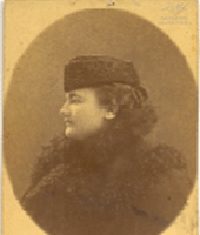
1867-1937
Nino Tatishvili often spent summers in Kvishkheti where she was taught literacy, French language and music at the family of famous public figure, Dimitri Kipiani. Later, she married actor Kote Kipiani, a son of Dimitri Kipiani.
Nino Tatishvili – Kipiani was a member of the board of Society for the Spreading of Literacy Among Georgians. She established the society, Imedi (Hope). The source of income of this association was a canteen and this income was spent on assisting the Georgian theatre and students. To strengthen the Ilia Chavchavadze foundation, she spearheaded the establishment of the women’s commission in 1907, which pursued the aim of assisting the Georgian youth to obtain higher education. This commission was set up after the pattern of Matitsa, the Czech society for spreading literacy.
Nino Tatishvili – Kipiani regularly published her letters in the Georgian press. She cooperated with the edition Nakaduli. In 1914, Nino Tatishvili – Kipiani, along with Ekaterine Gabashvili, Anastasia Tumanishvili and Gandegili – Dominika Eristavi, traveled to Adjara and then dedicated a number of letters to living conditions of women and the need to educate them.
Nino Tatishvili – Kipiani translated children’s stories from French into Georgia. She translated a famous historical novel “Spartacus” and a short story by I. Franko.
In 1923, Nino Tatishvili – Kipiani gave the Kvishkheti palace to the Union of Writers.
What Have We Done Wrong?
Author: Nino Tatishvili – Kipiani
“There are newspapers spread in front of me, recounting the festival conducted to honor our dear guests, Adjarians. The recount is so colorful and emotional that it unintentionally filled my heart with jealousy and gave rise to a question deep from my heart: have we, women, done anything wrong to those who organized that festival that they deprived us of an opportunity to attend the festival and experience those emotions too?
“Where and how should women show their moral or mental power, their talent and capacity of conducting public activity?
“You know full well that the public arena help any natural gift develop and any person form into a public figure. But is this arena available for women?
“We can repeatedly hear people saying here that Georgian women do not need to fight for emancipation because they have always been equal to men and remain to be such.
“It is a wrong opinion! Can anyone name me women conducting public activity on equal footing with men? Take a look at our cultural entities. They are many in number. One cannot find even a single woman among the management of these entities, comprising of seven or twelve men, save in commissions which are established at the board with women employed to ensure the material side of the activity – to sell tickets! Where should women act? Where should be they trained and educated for performing such a great role? Should they do that in a play on a stage? All our public work is developed and performed within the walls of this entity alone and I think no one would believe that among the numerous men in the boards of this entity there is not a single male who is inferior to women by their knowledge, their ability to care or work?! The conduct of public work along with men would at least be a sort of schooling for women for strengthening their national spirit, realizing their commitment to the nation.”
The newspaper Sakartvelo, issue #55; 10 March, 1916

